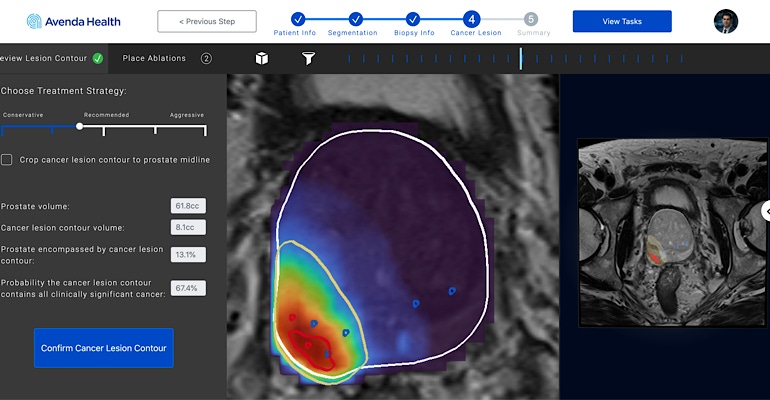AI-Enabled Prostate Cancer Therapy Wins Breakthrough Designation
Avenda Health said its focal therapy system uses artificial intelligence to treat localized prostate cancer in a urologist’s office under local anesthesia.
May 11, 2021

Avenda Health has been granted breakthrough device designation for a technology with the potential to treat prostate cancer in-office.
The Santa Monica, CA-based company said the Avenda Health Focal Therapy System, is an artificial intelligence (AI)-enabled focal therapy system being developed to treat localized prostate cancer in a urologist’s office under local anesthesia.
In conjunction with AI-based margin prediction algorithms that rely on a large database of imaging and pathology, it uses a laser and a proprietary optical and thermal sensor to precisely target and treat just the prostate tumor – not the entire prostate. The goal is for this targeted ablation to minimize the impact on healthy tissues, without compromising urinary or sexual function.
FDA has granted the Avenda Health Focal Therapy System 510(k) clearance for the ablation of tissue. However, Avenda has not yet commercialized the device because it is working to advance clinical trials in pursuit of a PMA for the technology for the treatment of localized prostate cancer.
The company was spun out of UCLA and was founded with support from a National Cancer Institute grant, which helped fund a Phase I study on 10 patients that recently completed enrollment. The study demonstrated safety and no decline in urinary or sexual function in patients over the follow-up period.
“Ten years ago, a group of dedicated clinical scientists at UCLA came together from urology, radiology, pathology and biomedical engineering with the goal of improving treatment for prostate cancer. Where we are today compared to when we started is remarkable,” said Leonard Marks, MD, co-founder and CMO of Avenda Health and professor of urology at UCLA. “Avenda Health continues to advance in this mission, and FDA’s recognition of the incredible impact that this technology could have on the field of urology in treating prostate cancer is encouraging.”
About the Author(s)
You May Also Like



